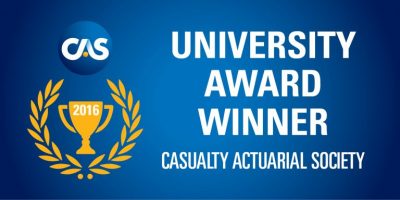Author: Damir Dzhafarov
Oleksii Mostovyi receives NSF CAREER Award
Tatiana Toro to Deliver Excelsior Lecture at 2019 NAN Conference
Combined Computing: Grant Tackles Major Interdisciplinary Questions
2019 Northeast Analysis Network Conference
Power in Numbers: NSF Grant To Help Researchers Attend Conference
UConn named 2019 Casualty Actuarial Society University Award recipient
 Our department has once again been named a Casualty Actuarial Society University Award recipient! From the award notification:
Our department has once again been named a Casualty Actuarial Society University Award recipient! From the award notification:
“Your program is receiving this recognition for the exemplary and innovative ways in which it prepares students for a career in the property and casualty insurance industry.”
Click here to read the full notification letter. Congratulations to our Actuarial Science faculty and students for their hard work and dedication. To read the full notification letter, see